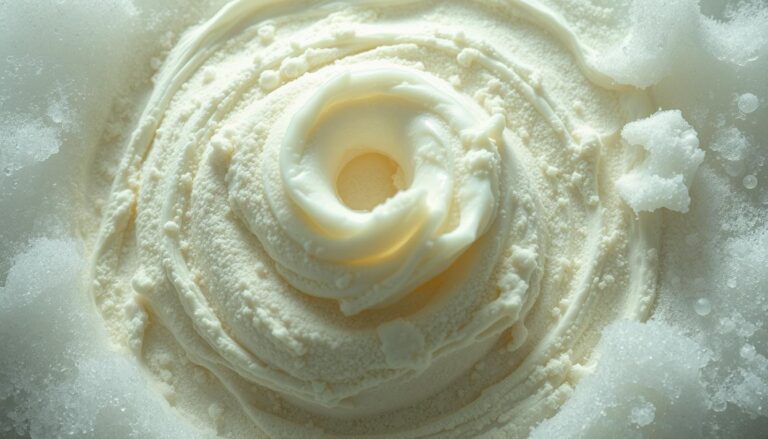How do I Prepare for a Dental Exam? Essential Tips
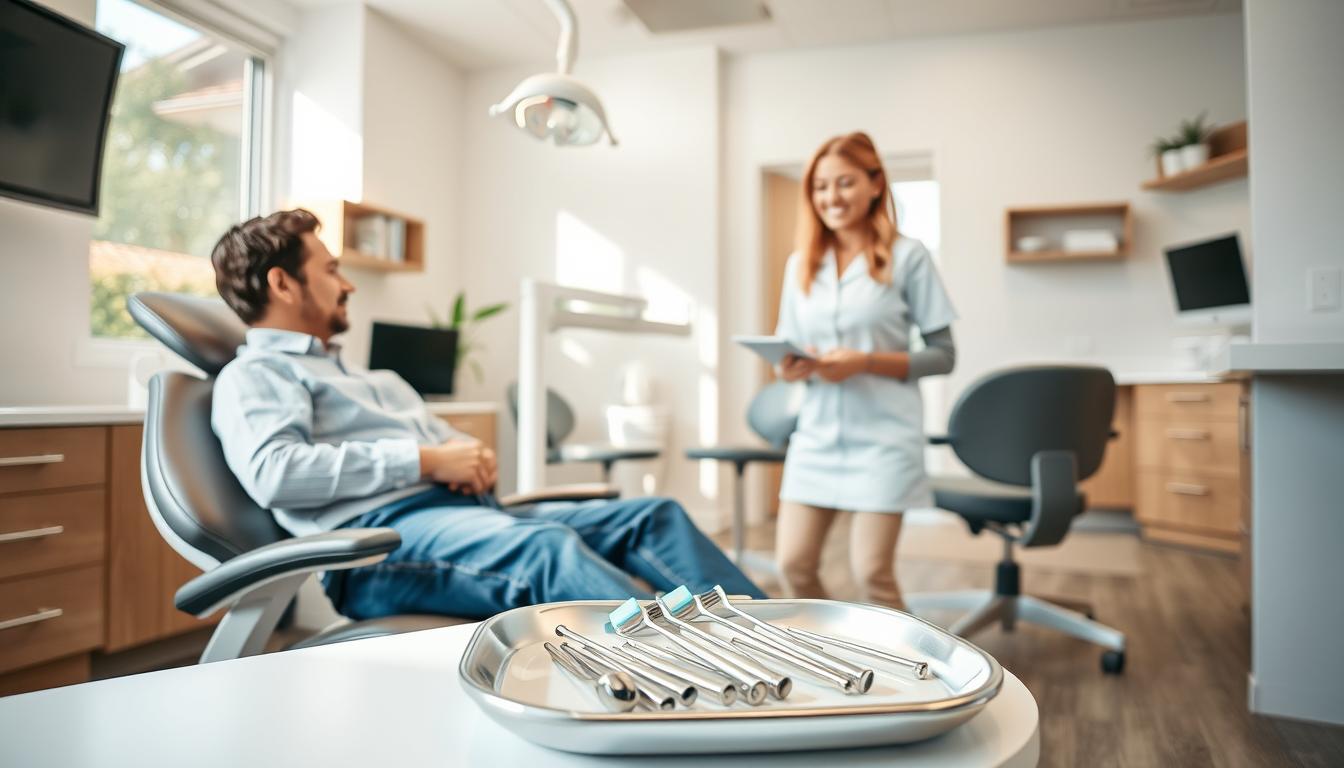
In our busy lives, it’s easy to forget simple things like brushing our teeth. Yet, almost 23% of Americans skip brushing for two or more days in a year. This fact shows why getting ready for a dentist visit is key.
Getting ready for a dental exam is more than just brushing your teeth quickly. It means being fully prepared. This helps make your visit more effective. Following some tips and forming good habits before your appointment is important. It helps your smile stay healthy and spots oral health issues early.
To really benefit from your dental exam, having a plan is advised. Check your insurance and make sure you can afford your treatment. Also, tell your dentist if your teeth feel different or hurt. This makes your visit more focused and might save you from bigger treatments later.
Show up on time with clean teeth. This lets your dentist focus on your oral health, not cleaning your teeth. This ensures a smooth visit and shows you care about your health. For more tips on how to get ready for a dental check-up, check Smiles by Design in Huntsville. They offer personalized advice. Visit their website here for more info: Smiles by Design Huntsville.
Key Takeaways
- Early preparation can lead to a more efficient and effective dental exam.
- Confirming payment methods beforehand avoids financial surprises post-visit.
- Open communication with your dentist eases the process and helps target your specific needs.
- Maintaining pristine oral hygiene prior to the exam is crucial for a beneficial visit.
- Being punctual for your dental appointment optimizes the time for both you and your dental care team.
Understanding the Purpose of a Dental Exam
Dental exams are key for not just keeping your mouth healthy but also stopping future problems before they start. They prepare you for a dental visit and ensure you get the best care possible. Knowing what happens during these exams makes everything less scary and easier to handle.
Importance of Regular Check-ups
Going to the dentist regularly is a must for good oral health. These visits catch early signs of tooth decay, gum disease, and other issues. Sticking to a dental exam schedule helps avoid big and expensive treatments later. Plus, cleaning your teeth well before a visit makes these check-ups even more effective.
Common Procedures During Exams
A lot happens during a dental exam to keep your mouth healthy. They take off tartar and plaque to stop gum disease. Sometimes, they do X-rays to find problems you can’t see. They also polish your teeth, leaving them feeling smooth and clean.
The Role of Preventive Care
Preventing problems is the main goal of dental exams. They use fluoride treatments and dental sealants to make teeth stronger and protect against cavities. By following good dental exam tips and keeping up with daily oral hygiene, you can really cut down on dental diseases.
Check out these common dental procedures and their benefits:
| Procedure | Description | Benefits |
|---|---|---|
| Cleaning | Removal of plaque and tartar, followed by polishing teeth. | Prevents gum disease and improves breath freshness. |
| X-rays | Detailed images of the teeth and jawbone. | Helps in identifying decay, tumors, or cysts not visible to the eye. |
| Fluoride Treatment | Application of high fluoride concentrate to the teeth. | Strengthens enamel, reduces the risk of decay. |
Researching Your Dental Office
Finding the right dental office is key to good dental appointment advice. It’s about more than just a one-time visit. It’s about finding a place that looks out for both your short-term and long-term dental health. Being well-informed helps you make the best choice for your health needs.
Start by looking at the credentials and reviews of dental offices around you. Many people now check online to see what others say about a dentist before they book. Good reviews and high ratings show that an office is skilled and trusted.
It’s also key to know what services are offered. A wide range of services means a dental office can meet many needs. This is great for getting all your care in one place. Make sure their services fit what you need for your teeth.
Location and accessibility matter a lot, too. You want a dentist that’s easy to get to, whether by car or public transport. If it’s easy to get to, you’ll likely keep up with your visits. This helps keep your teeth healthy.
| Credential Check | Services Offered | Location & Accessibility |
|---|---|---|
| License verification | General and Pediatric Dentistry | Close to public transport |
| Peer reviews and patient testimonials | Orthodontics and Cosmetic Solutions | Handicap accessible facilities |
| Board Certifications | Emergency Dental Care | Ample parking space |

In the end, considering these key points makes choosing a dental office easier. It means you’ll likely be happier with your dental care. And it helps your treatment work better. Keep in mind, the right dental office is important for your overall health. So, pick carefully.
Gathering Relevant Medical History
Before you go to a dental check-up, it’s key to update your medical history. This step makes sure your dental care suits your health needs. Knowing your full health background helps dentists decide the best treatments for you.
It’s important to tell dentists about any current medications and allergies you have. This info helps them avoid using things that could cause bad reactions or mess with your medicine. Knowing how your meds and allergies affect your dental is crucial for keeping you safe.
Telling your dentist about past dental problems helps handle old issues better. Sharing info about family dental history helps guess possible genetic issues. This might give you a head start in dealing with hereditary dental problems.
Here’s a brief look at what to focus on:
| Category | Details to Include | Reason for Inclusion |
|---|---|---|
| Current Medications | List of all current medications including non-prescription ones | Prevents drug interactions and allergies during treatments |
| Allergies | Type of allergy (drug, food, latex, etc.) | Ensures a safe dental service environment |
| Past Dental Issues | Any previous dental treatments or surgeries | Assists in determining a suited approach to often recurring conditions |
| Family Dental History | Known dental diseases in the family like periodontitis, dental caries | Helps in early diagnosis and preventive care for potentially inherited diseases |
Remember, updating your dental history is crucial when getting ready for a dental check-up. This keeps your care safe and suited to you, making your dental visits more effective.

Preparing Questions for the Dentist
Getting ready for your dental appointment means having questions ready for your dentist. This makes sure you get the most out of your visit. It also makes sure all your concerns get the attention they need. Here’s a guide to help you come up with key questions. These will make your dental exam both informative and successful.
- Common Concerns to Address: Start by writing down any symptoms or changes in your mouth you’ve noticed. You might ask about sensitivity, pain, or changes in how your teeth and gums look.
- Inquiring About Treatment Options: If you’re dealing with a specific problem, find out what treatments you can get. This should cover the good and bad sides of each option, what results you can expect, and how long treatment will take.
- Asking About Dental Hygiene Practices: For better daily care of your teeth, get advice on the best dental hygiene methods just for you. This could involve the kind of toothbrush, toothpaste, and floss to use, plus brushing tips.
Taking this all-encompassing approach to your dental visits leads to fruitful talks with your dentist. These discussions can help you stay on top of your oral health or make it even better.
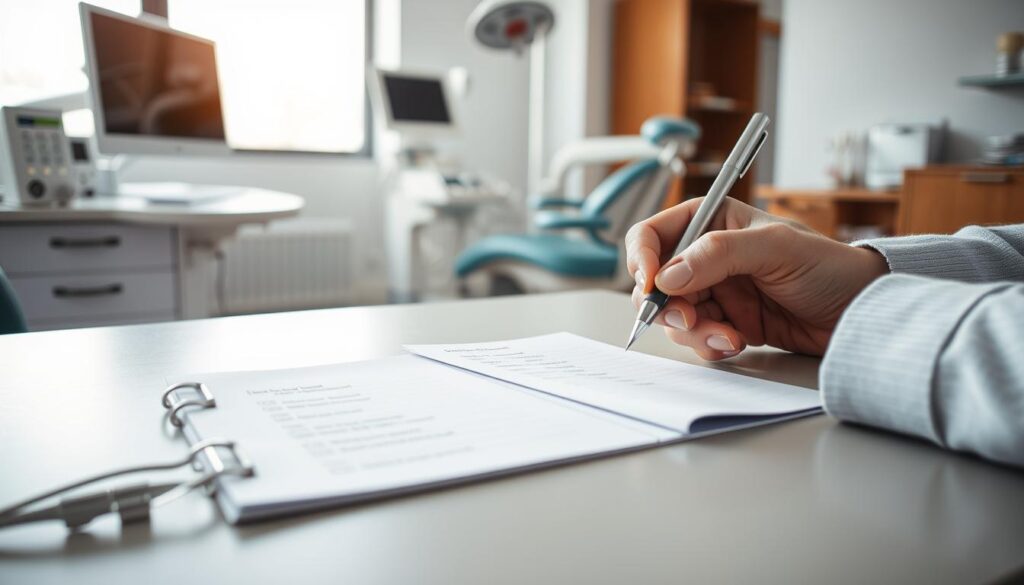
Maintaining Good Oral Hygiene Pre-Exam
Keeping your oral hygiene top-notch before a dentist visit matters a lot. It’s key for getting ready for a dental visit. Good care before the visit helps your overall teeth and gum health.
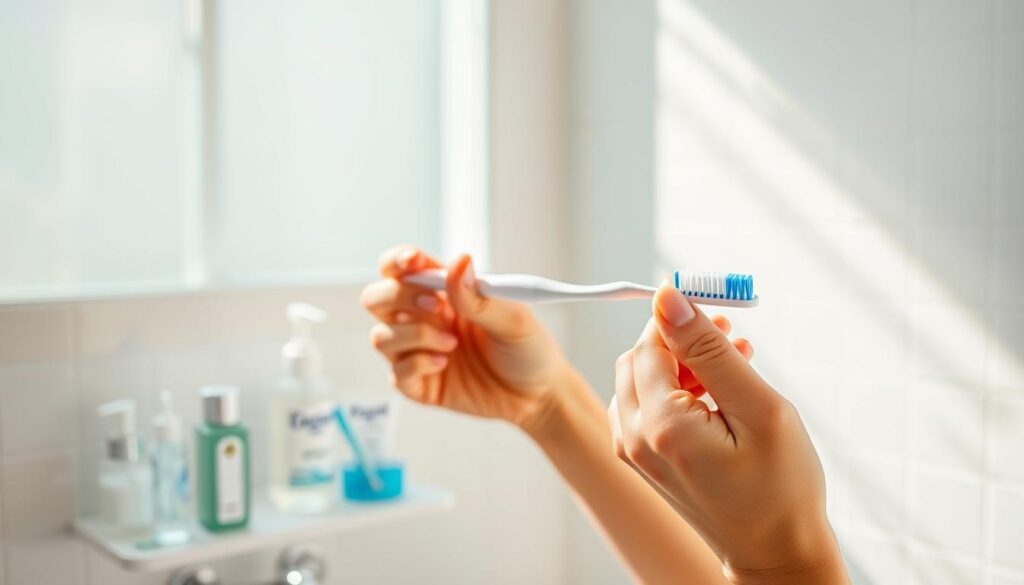
Brushing and Flossing Techniques: The right way to brush and floss is essential. You should brush twice daily with fluoride toothpaste and floss every day. This habit fights plaque and keeps tartar from forming, making your dentist’s job easier.
The Role of Mouthwash: Adding antibacterial mouthwash to your routine is smart. A quality mouthwash keeps your breath fresh. It also keeps bacteria low, cutting down infection risks during check-ups.
Avoiding Certain Foods Before the Exam: To make your exam go smoothly, avoid foods and drinks that can stain. Skip sticky, hard, or colorful foods and drinks like candies, nuts, coffee, or red wine before your visit.
What to Expect During the Dental Exam
Going to the dentist for a check-up leaves many wondering about dental check-up tips and what to expect at a dental exam. Knowing the steps can ease your nerves and get you ready for a smooth visit.
The first part of your visit involves a deep look into your mouth’s health. You’ll likely get X-rays. They’re key for spotting problems that a normal examination might miss. X-rays show cavities between teeth, check the jawbones, and inspect teeth under the gums.
After the X-rays, it’s time for cleaning and polishing. Even if you brush and floss well at home, this step gets rid of plaque and tartar. A clean mouth reduces your risk of gum disease and tooth decay significantly.
Then, the dentist talks about what they found and gives advice for your teeth’s care. They might suggest treatments or ways to better care for your teeth at home. It’s a chance to learn more and ask questions about your dental health.
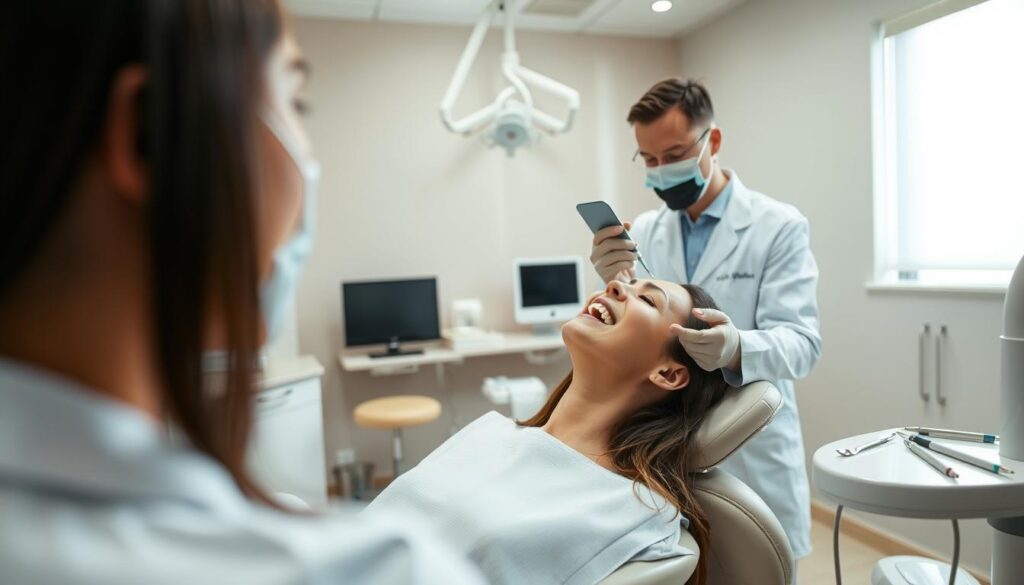
Every step of your dental exam is important for keeping your mouth healthy. Knowing what to expect at a dental exam helps you feel ready and confident. It lets you take an active role in caring for your dental health.
Navigating Dental Anxiety
For many, thinking about a dentist visit can be really scary. It’s key to understand and handle this fear for a better dental visit. We’ll talk about ways to deal with this issue, including useful tips for your next dentist appointment.

Dental anxiety comes from different fears, like worry over pain or the noise of the tools. Knowing what makes you scared is the start of feeling better. It helps to stay relaxed and focus on feeling good before seeing the dentist.
- Deep Breathing: Simple deep breaths can help keep your body calm.
- Visualization: Thinking of a calm place or a good dentist visit can shift your focus from the fear.
- Soothing Music: Calm music before and during your visit can help lower stress.
- Open Communication: Talking about your fears with your dentist can change the treatment plan to make you more comfortable, sometimes even including sedation.
Using these methods can help you manage dental anxiety. Talking openly with your dentist about your fears can change how you feel about dental care. It turns it into something more personal and less scary.
Financial Preparation for the Exam
Getting ready for a dentist visit means more than just showing up. You need to think about the costs. It’s key to understand your dental insurance and out-of-pocket costs. This way, you can handle your money better.
Dental insurance usually pays for a lot of your visit. But, you should check what it really covers. Start by looking at what your insurance does and doesn’t pay for. This will let you know what services you might have to pay for yourself. Learning about your insurance helps avoid any surprises and assists in planning your budget.
Talking about payment plans with your dental office before you go can also help. This chat makes sure you and the office understand each other. It makes paying during your visit easier.
One thing people often forget is the extra costs not covered by insurance. This could be for special fillings or beauty treatments. Knowing these things ahead of time lets you make smart choices and get your money ready.
“Knowing the full scope of potential dental costs can significantly reduce the anxiety often associated with financial planning for health services.”
Using these tips for your dentist visit means you’re ready health-wise and money-wise. This helps make sure that worrying about costs doesn’t ruin your visit to the dentist.
The Importance of Follow-Up Appointments
Going to follow-up appointments with your dentist is key to keeping your mouth healthy. These visits help check your dental health, find any problems, and make sure treatments are working. They are an important part of taking good care of your teeth, helping to stop dental diseases before they start.
Doctors decide when you should come back based on your dental needs. These follow-up visits can stop bigger problems later. By going to these appointments, you help keep your mouth healthy and meet your dental goals.
Follow-ups are great for spotting new or coming back dental problems early. Catching things like gum disease or cavities early can mean less severe treatments are needed later.
It’s key to adjust your dental care plan based on what the dentist finds at these appointments. Changes might include more fluoride, changing how your teeth are aligned, or dealing with new cavities. These changes help keep your teeth healthy.
| Appointment Type | Purpose | Typical Frequency |
|---|---|---|
| Initial Consultation | Assess overall oral health, create a treatment plan. | 1st visit |
| Regular Check-Up | Monitor health, update on progress. | Every 6 months |
| Post-Treatment Follow-Up | Ensure treatments are effective, adjust as necessary. | As recommended |
Not going to your dentist’s follow-up checks can slow down improving your oral health. Being active in these appointments is more than just following orders. It’s about keeping a mindset that stops serious dental problems before they begin.
Choosing the Right Time for Your Appointment
When you plan a dental visit, picking the best time matters a lot. This choice impacts how well the visit goes and how comfortable you feel. Think about your daily schedule when you choose.
Try to book your dental exams when you’re not too busy. Doing so can make the visit less stressful and more focused on your teeth. Also, quieter times at the clinic mean you get more attention.
Don’t wait until the last minute to schedule your dentist visit. Planning ahead helps you get ready better, making any needed tests or paperwork smoother.
| Time of Year | Advantage | Disadvantage |
|---|---|---|
| Early January | Start the year focusing on dental health | Possible post-holiday scheduling conflicts |
| Mid-March to April | Pre-summer check-ups, lower clinic congestion | Aligns with busy spring activities |
| September | Post-summer, pre-holiday calm period | School season restarts, potentially busy for parents |
The best timing for dental exams lets you arrive without rushing. Being ready to talk about your dental health improves your visit. This careful timing leads to better care and healthier teeth.
Organizing Documentation
Getting ready for a dentist visit isn’t just about brushing and flossing. Having your documents ready can make your visit faster and more helpful. This guide gives you a checklist for your dental visit, so you have everything you need.
It’s important to bring your medical records, including dental X-rays and treatment histories. They let your dentist get a clear picture of your dental health. This way, they can make a treatment plan that’s right for you. Here’s a look at the key documents you should bring to get ready.
Essential Records to Bring
- Complete dental records from previous visits
- Recent dental X-rays, if available
- List of current medications and allergies
- Dental insurance details for billing purposes
Importance of Prior Dental X-rays
Prior dental X-rays give a full look at how your dental health has changed. They’re great for spotting small changes. With them, your dentist can see things they might miss in a regular check-up.
Keeping Track of Treatment History
Keeping good records of past treatments helps you and your dentist. You should include what procedures you’ve had, ongoing treatments, and future plans. These records help choose the best care and steps to take next.
Remember, organizing your dental records well helps your dentist give you the best care.
Being Mindful of Lifestyle Factors
Lifestyle choices play a huge role in your oral health, from your teeth to gums. By understanding these factors, you can better care for your mouth. This helps you get ready for your next dental check-up.
Diet and Its Impact on Oral Health
What you eat is key to keeping your teeth and gums healthy. Sugary and acidic foods can cause tooth decay. To avoid these problems, eat more calcium-rich foods, fruits, vegetables, and drink lots of water. These good habits can help your teeth stay strong and prevent dental issues.
Smoking and Oral Hygiene
Smoking harms your oral health, leading to gum disease and tooth loss. Quitting is important for both your overall and oral health. Dentists can help by offering resources and support. This is a critical part of maintaining your oral health.
Stress Management Techniques
Stress can hurt your oral health, causing conditions like bruxism and TMJ. To manage stress, try exercising, meditating, and getting enough sleep. These steps not only better your oral health but also make your dental check-ups go smoother.
Understanding Oral Cancer Screenings
Oral cancer screenings are key preventive steps at regular dental check-ups. They aim to catch oral cancer signs early, making treatment more effective and potentially saving lives. Let’s explore what these screenings involve and why they are a critical part of your dental care routine.
Importance of Regular Oral Screenings
Getting screened regularly can catch oral health issues early. These screenings are both quick and painless. They involve looking and feeling inside your mouth for any unusual signs.
Questions to Ask During the Screening
- How often should I undergo an oral cancer screening?
- What specific signs or symptoms are you looking for during the screening?
- Can you demonstrate how I can check myself for symptoms at home?
- Are there any particular risk factors or lifestyles that increase my risk of developing oral cancer?
Signs to Watch for Between Exams
Between dental visits, keep an eye out for early signs of oral cancer. This includes non-healing wounds, unexplained bleeding, and sores that won’t go away. These symptoms could indicate oral cancer.
| Risk Factor | Description | Recommended Action |
|---|---|---|
| Tobacco use | Smoking or using smokeless tobacco products greatly increases risk. | Seek help to stop using tobacco products. |
| Excessive alcohol consumption | High levels of alcohol intake are linked to oral cancer. | Limit alcohol consumption to moderate levels. |
| HPV | Certain strains of human papillomavirus are associated with oral cancer. | Discuss HPV vaccination with your doctor. |
| Unusual oral pain or discomfort | Pain that persists without an obvious cause could signal cancer. | Consult your dentist immediately for a thorough examination. |
Preparing for Pediatric Dental Exams
Getting ready for a kid’s dental check-up is crucial. It can help make the visit smoother and less scary for them. Tell them why taking care of their teeth is important in a fun way. This approach can help manage their fears.
Teaching Children About Dental Visits
Educating kids about dental exams is key. Simple explanations help them see these check-ups as necessary for staying healthy. Using children’s books or videos makes learning fun.
Making the Examination Process Fun
Thinking about a dental exam can make kids nervous. Dentists sometimes use games or fun themes in their offices. This can turn the visit into an exciting adventure for them.
Addressing Children’s Fears
It’s important to deal with kids’ dental fears. Using gentle words, giving praise, and letting them touch the tools under supervision can help. Making sure they feel comfortable sharing their feelings is key.
Parents can also learn more by visiting Understanding the Dental Cleaning Procedure. This site can help them prepare their child better for a dental exam.
The Role of Technology in Dental Exams
Technology is changing dental exams for the better. It makes exams faster, more precise, and less painful. Patients are happier because the quality of care is better and there’s less discomfort.
New diagnostic tools are at the forefront of these changes. Tools like intraoral cameras and digital X-rays show detailed views of the mouth. Early detection of problems means more effective treatment and less damage to teeth.
Technology also means less pain during treatments. For example, computer-assisted anesthesia is less invasive. Laser dentistry reduces the need for sutures and shortens recovery time.
Virtual consultations are another perk of dental tech. They save time and cut down on office visits. This means care can be more personalized and adjusted quickly when needed.
Post-Exam Care and Recommendations
After your dental exam, it’s time to focus more on keeping your mouth healthy. It’s important to follow up on your dentist’s advice closely. The tips you get from your dentist are based on lots of research and experience. They help you keep your teeth and gums healthy.
Changing your teeth-cleaning habits is key after seeing the dentist. This might mean brushing your teeth better, flossing more, or using special mouthwash. These changes make sure the good work your dentist did lasts longer. If your dentist suggests new products or methods, try them out. They could really help improve how clean your mouth feels.
It’s also important to book any other treatments you need right away. Solving dental problems early usually means they’re easier to deal with. Waiting too long could make things worse and might mean more treatments later. Being quick to book treatments shows you care about keeping your mouth healthy. Regular visits to the dentist, making changes to your daily care, and working with your dentist are all steps to better dental health.


